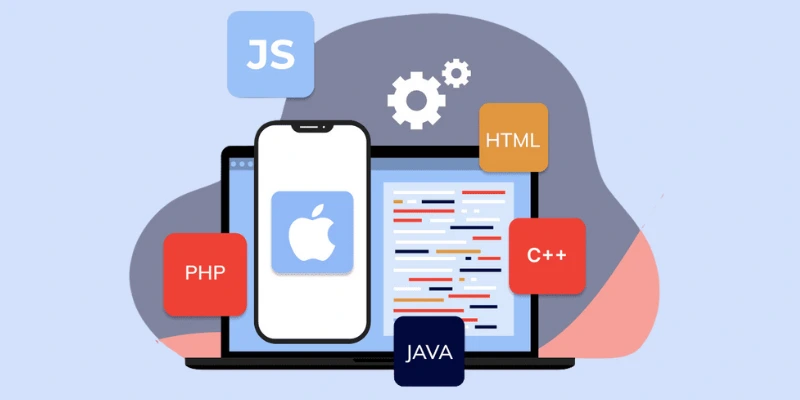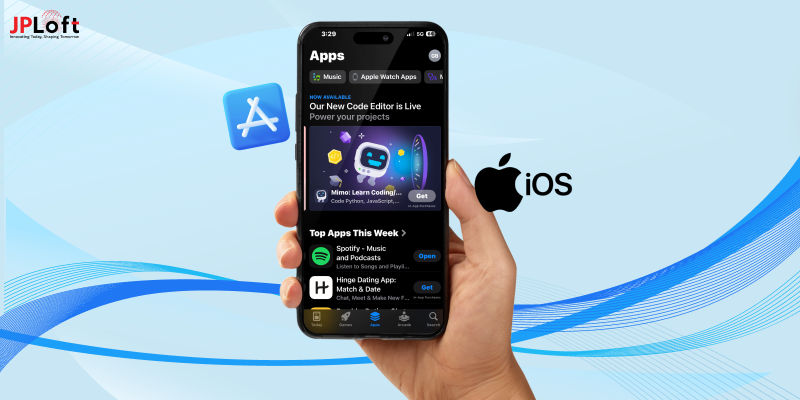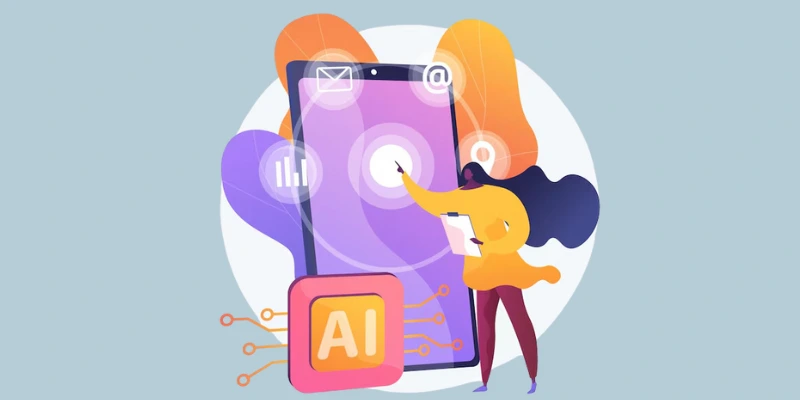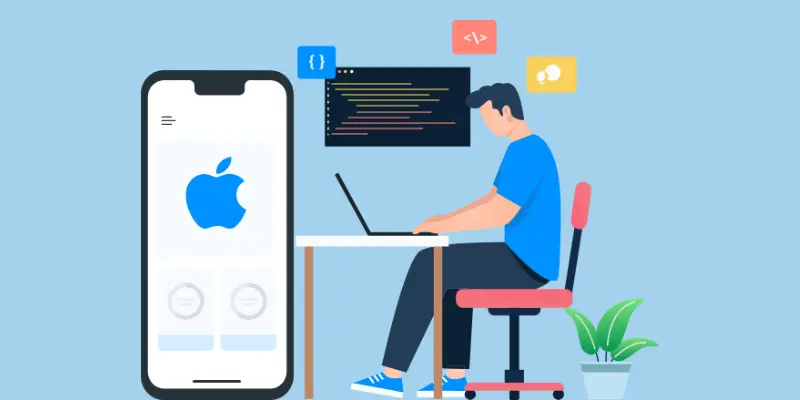Mobile apps have completely transformed our daily lives, and we use them numerous times a day for various things. We use these feature-rich, engaging mobile applications for everything from buying online and booking a taxi to streaming our favorite movies. Mobile apps add convenience and ease to our lives, and we couldn't be more grateful to technology.
But when it comes to iOS app development services, picking the best programming language is crucial. This will affect your app's performance and how well your users will like it. The type of technology you select to develop your app will affect how the users will experience it. Choosing the wrong platform could cost you the money, time, and work you've invested in.
Choosing the right programming language for iOS apps will significantly affect the application's user experience, functionality, and overall quality. Whether you're an experienced programmer or a newbie seeking to enter the app development field, knowing the various languages and their distinct characteristics is crucial.
This guide will examine the top programming languages used for iOS application development and how to choose the best one.
What Is iOS Programming Language?
iOS programming languages provide software developers can use to create applications running on iOS. Apple's programming languages are used to create applications for the iOS platform. They must be compatible with the Apple ecosystem, which means that applications work with iOS devices such as iPhones and iPads. Picking the correct programming language is vital to making effective iOS applications. It impacts everything from the app's efficiency and security to how easily it will be upgraded or maintained.
iOS programming languages are essential to this ecosystem and facilitate the creation of a variety of mobile applications compatible with different Apple products running on the iOS platform. This expands the number of applications available on these devices and offers businesses ways to interact with their customers.
Even though Swift is the preferred language, Objective-C remains relevant and is used in existing iOS projects and when working with codebases from the past. iOS developers can use both languages in the same project, allowing an easy transition to and gradual introduction of Swift.
Choosing The Right iOS Programming Language
Picking the correct programming language is critical in any iOS application development. The choice of language significantly affects the entire creation process, the application's performance, and its durability over time. Selecting the appropriate language may be the difference between having a profitable app that is appreciated and well-liked or struggling to get noticed in the highly competitive app market.
Also Read: How To Hire iOS Developer For Your Next Project
In the case of iOS application development, the two main programming languages you should consider include Swift and Objective-C. Both have distinctive strengths and weaknesses, so the decision between them is contingent on a range of variables, such as the skills of your developers, the nature of the app, and the goals you have for development. Considerations like speed, user-friendliness, and community support compatibility with the most recent iOS capabilities should be considered before making a final decision.
Ultimately, the programming language you choose can enormously influence the success of the iOS application. Take the time to learn the specifics of every language and the ways they can be aligned with your app's specific requirements. You can be sure that your app's foundation is the right foundation and set to be successful over the long term within the extremely fiercely competitive iOS app marketplace.
Programming Languages For iOS Development
With the many options, the vast array of iOS programming languages could seem daunting. But, the top iOS programs stand out for their distinct advantages and usage instances:
Swift
Swift is a contemporary programming language developed by Apple specifically for the development of iOS, macOS, watchOS, and TVOS applications. With a simple-to-read and written syntax, Swift quickly gained recognition among programmers for creating various software. It has security options and strong tools to build rapid and reliable software.
Objective-C
Objective-C, the primary language that Apple's platforms have used for several years, has been a popular selection for custom iOS app development. Even though it's considered old-fashioned compared to Swift, it is utilized to maintain old codebases and support older iOS devices. Objective-C was developed to be compatible with Apple's hardware, providing high performance and customization to the needs of the equipment.
Even though Swift is now the most preferred programming language for iOS development, Objective-C's place in the development of iOS should not be underestimated. It's a testament to the growth of iOS programming languages and continuous advancements in the area.
C# And Xamarin
C# and Xamarin make an extremely powerful combination within the field of Cross-platform Android development. Utilizing Xamarin C# allows for the collaboration of codebases on both iOS and Android platforms, allowing for an integrated approach to mobile application development. This makes for a simpler design process for rapid deployment and easier maintenance.
C# and Xamarin have been employed in numerous iOS applications, evidence of their performance and versatility. This powerhouse that runs across platforms is an appealing option for developers looking to make their apps.
React Native
Although it is not a programming language, React Native is remarkable due to its popularity and cross-platform nature. Programmers can use JavaScript to develop iOS applications that appear natural. Developers can write code with React Native and deliver it across multiple platforms like iOS and Android. While it has many advantages regarding development speed and code reuse, gaining access to certain platform-specific features can be challenging.
Java
It's a class-based, general-purpose, object-oriented programming language. Java code does not require the recompilation process to work on every platform. The dependencies on the implementation of Java are reduced to the minimum. By utilizing the assistance of a Java development company, you can improve your company's efficiency by developing scalable and secure online applications.
Flutter
Like React Native, Flutter is a cross-platform platform that lets iOS app development company build iOS applications with its Dart programming language. Flutter provides a wide range of pre-designed widgets, a hot reload function for speedy development, and high performance. It lets developers create attractive and extremely customizable user interfaces. But, like React Native, there may be restrictions on accessing specific features for a particular platform.
JavaScript And React Native
Combining technologies creates a strong mix of JavaScript and React Native, enabling efficient web-based development. The combination allows cross-platform application development and cross-platform application development, using technology from web technology to develop apps that function effortlessly on iOS and Android. JavaScript, coupled together with React Native, enables rapid growth and sharing of codebases, making it the ideal solution for short-term, smaller iOS projects as well as native applications.
Factors To Choosing iOS Programming Language
The selection of the right iOS programming language involves analyzing several factors, such as the app's size, difficulty, and developers' experience. It's not something to be taken lightly since the language chosen must be compatible with your app's needs and the company's overall objectives. Additionally, being able to integrate with an iOS operating system will be essential to ensure smooth application development.
The ability of a language to be versatile can play a crucial role. A flexible language permits a wider variety of apps to develop mobile apps. This makes it a popular option for developers. This section will explore the most important aspects of selecting the iOS programming language.
Also Read: Challenges in iOS App Development
Define Project Scope And Complexity
The complexity and size of the iOS application will significantly affect the decision to choose a programming language. When apps require extensive data processing or complex capabilities, Native development is usually the preferred option. Therefore, selecting a suitable programming language is based on a deep knowledge of the application's needs and the user experience the app will provide.
Platform
The platform you select to run your application will greatly help you to choose the appropriate programming language. If, for instance, you intend to run a programmer written in C on Windows and Linux, it will need platform compilers and two distinct executables. However, once you run an application created in Java, it can be used on any operating system.
Does the programmer's language simplify adding additional features to your current application? If not, you'll need to consider a different alternative. Suppose the language doesn't permit or make it hard for developers to create new features or libraries in an app already developed. In that case, it is essential to reconsider using the appropriate language to build your app.
Developer Expertise
The developer's knowledge significantly impacts the choice of iOS programming language. The expertise of your developers in a specific language could lead to quicker projects and higher code quality. So, knowing the strengths and capabilities of your team's development is essential when choosing the correct programming language.
If you're looking to become an iOS developer, Swift is a great start. It was designed to be a language that is accessible for novices. Swift offers support through instructional tools such as Swift Playgrounds, which make learning more enjoyable and easy to master.
Suitability
To ensure that the language used in programming is appropriate for the intended platform, it must first be capable of working on any platform. Then, the programming language can have many users using it simultaneously. Certain programming languages only function with specific hardware or software. The reason is that they support only certain features and tools on particular applications. Knowing the programming language before starting an undertaking is crucial; doing so will save you time and money.
Compatibility With Multiple iOS Versions
When developing an iOS application, it is essential to remember that only a few iOS users update their devices regularly. Therefore, it is necessary to think about interoperability. Sometimes, your application works with the latest version, but users are still using the previous version. In this case, a customer will likely feel frustrated and delete the application.
Expandability
Certain languages for programming are more effective when handling large numbers of users with no crashes than other languages. This is because specific languages are more effective when expanding and scaling. After all, they are equipped to allow for large numbers of users. In the case of interactive websites, for instance, if the site needs to handle many users. Therefore, it has to be able to use a programming language with expansion factors.
Cross-Platform vs. Native Development
The choice between native and cross-platform iOS development is a key aspect that influences the programming language selection. Both have distinct benefits and drawbacks. Highly-performance, complex apps often require native iOS development. However, cross-platform development allows for faster growth and reaching a larger market with just one code base.
The efficiency and speed of maintenance for software on cross-platforms and native iOS development are influenced by the accessibility of appropriate development tools and a compatible developed environment. So, the scalability of a programming language must be assessed in terms of its ability to handle many users simultaneously without compromising performance.
Examine Internal Capabilities
The first thing to factor in is your iOS application capabilities. The app development team typically includes iOS developers, UX/UI designers, front-end developers and QA professionals, a project manager, and many more. What is required to be included in the team is contingent on the complexity of the project and its scope.
To ensure that everything runs within your budget and timeline, you should choose those with the right skills and knowledge and a thorough comprehension of your business. If your staff isn't equipped to create a successful application, outsourcing the entire project or hiring additional external workers could be worth a look.
Also Read: Mobile App Development Platforms for iOS Project
Key Considerations For iOS App Development
It is important to realize that creating an exceptional iOS app requires an extensive planning process and careful evaluation. Before launching an iOS application, some factors should be considered.
Describe Its Objective
Before beginning, think about why you decided to build your application and then attempt to address a couple of concerns, like the user requirements your app is designed to meet, the reason you intend to create the app, and if you already have similar apps. Such questions could be addressed to make the presentation of your app's features to customers much more accessible. Furthermore, you'll be more proficient in analyzing strategies for developing apps.
Conduct Market Research Thoroughly
Many businesses ignore this step even though it is crucial. Learn more about these issues to get customers to install and utilize your application effectively. Surveys and creating an outline of your typical users based on age, nationality, and gender are crucial for understanding the present situation. By using these strategies, you can make a custom marketing plan to increase the number of downloads.
Plan Out Your iOS App Development
Plan and ensure the plan is as thorough as you can and contains all of the information needed after analyzing the reason for your plan and conducting studies. Before beginning the planning process, it is essential to ask several questions.
Be sure to answer these concerns: which technologies will work best for creating the app? What are the functions of the user's interface? What will be the best way to determine the app's effectiveness, and what security considerations should be considered while making the application? Consider researching the most popular mobile app developments to ensure you stay on top of trends while developing the overall plan.
Consider Compatibility For Multiple iOS Versions
If you are developing an iOS application, remember that a few iOS users can update their devices often. The interoperability of the app must be a consideration. If an individual is operating an older version of the program, but the program you have created works with the most current iOS version, they could be unhappy and remove the application. This is why you must concentrate on making your app compatible with all operating systems.
Conclusion
One crucial decision that could be a significant factor in the success of your iOS app venture is selecting the most efficient programming language to use to create iPhone applications. Because of its advanced and powerful code platform, Swift has established itself as the leading language for iOS development. However, depending on the requirements of your app as well as the experience of your iPhone app development company team, Other solutions such as Objective-C, React Native, Flutter, and Xamarin could also be viable options.
With this deep understanding, you'll be better able to navigate the difficult world of iOS application development. Making sure you use the appropriate programming language, along with a thorough understanding of your app's goals, your team's experience, and advanced development methodologies.












Share this blog